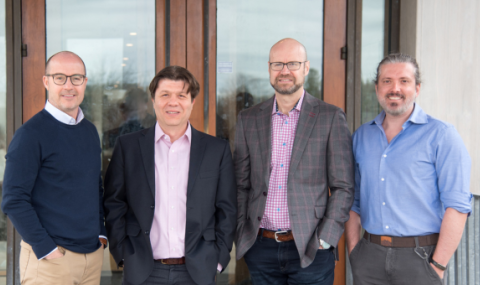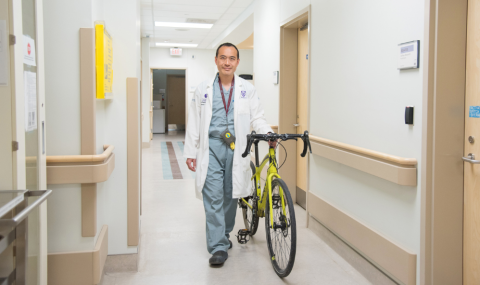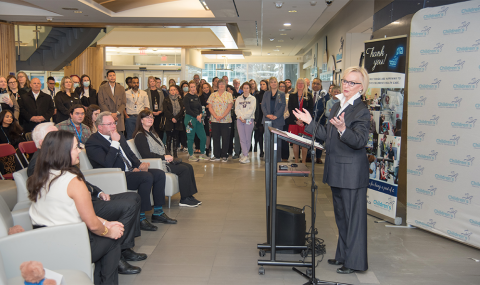MEDIA RELEASE
For Immediate Release
April 18, 2013
LONDON, Ontario - London Health Sciences Centre (LHSC) is home to the country’s longest running heart transplant program, with over 600 transplants performed since it was established in 1981.
Until now, many patients with advanced heart failure requiring a transplant have had to remain in hospital while awaiting a donor organ. Hooked up to intravenous pumps providing life-saving medication, these patients were limited in what they could do, drastically impacting their quality of life.
“Because there aren’t enough donor hearts to meet the need of these advanced heart failure patients, people waiting for their heart transplant have a very real risk of organ failure and death,” said Dr. Dave Nagpal, LHSC cardiac surgeon. “To temporize the situation, we sometimes need to admit people to hospital for intravenous treatment and often, these patients would have had to wait in hospital for an indeterminate length of time until a donor organ was available.”
33-year-old Suzana De Sousa is the one of those patients. De Sousa has been in hospital awaiting a life-saving heart transplant, needed as a result of congestive heart failure, for the past 72 days. Today, however, she is preparing to return home to Kitchener, Ontario thanks to a new heart support device available to eligible cardiac patients at LHSC.
The device is called the HeartMate II Left Ventricular Assist Device (LVAD) developed by Thoratec Corporation. An internally implantable device, the LVAD was developed with the goal of providing years of circulatory support for patients in heart failure, allowing them to leave hospital and return to their lives as they await the availability of a donor heart. De Sousa is the second patient at LHSC to receive the device.
This is an important development for patients, not only because of the quality of life they are able to regain, but also because the LVAD improves the circulation, it results in preserved organ function and a lower risk of death while waiting for their donor heart. Better blood circulation makes participating in rehabilitation and increasing nutrition possible, making these patients stronger and better transplant candidates, ready for the demands of a heart transplant and recovery.
LHSC will also soon have a second device available to patients called the HeartWare Ventricular Assist System which is a smaller LVAD that may be better suited for some applications.
“We are pleased with the result we have seen in Ms. De Sousa. She will be able to go home and spend time with her family and friends rather than sitting in a hospital bed while we wait for a suitable donor heart to become available,” continues Dr. Nagpal.
“I am so thankful that we have this technology to help me go home and live my life,” says De Sousa. “My family and friends have been wonderful visiting me while I have been in hospital, but nothing beats sleeping in your own bed and being in familiar surroundings. I am happy to be one of the first people at LHSC to receive this device, and feel like I am part of the team helping to learn and advance patient care.”
-30-
About London Health Sciences Centre
London Health Sciences Centre has been at the forefront of medicine in Canada for 138 years and offers the broadest range of specialized clinical services in Ontario. Building on the traditions of its founding hospitals to provide compassionate care in an academic teaching setting, London Health Sciences Centre is home to Children’s Hospital, University Hospital, Victoria Hospital, the Kidney Care Centre, two family medical centres, and two research institutes – Children’s Health Research Institute and Lawson Health Research Institute, a joint research initiative with St. Joseph’s Health Care London. As a leader in medical discovery and health research, London Health Sciences Centre has a history of over 65 international and national firsts and attracts top clinicians and researchers from around the world. As a regional referral centre, London Health Sciences Centre cares for the most medically complex patients including critically injured adults and children in southwestern Ontario and beyond. The hospital’s nearly 15,000 staff, physicians, students and volunteers provide care for more than one million patient visits a year. For more information visit www.lhsc.on.ca
Contact Information:
Kathy Leblanc
Communications Consultant
London Health Sciences Centre
519-685-8500 ext. 74772
kathy.leblanc@lhsc.on.ca
After-hours assistance:
Call LHSC Switchboard at 519-685-8500 and ask to page the communication consultant on-call
Like us on Facebook at LHSC Canada, follow us on Twitter @LHSCCanada and watch us on YouTube at LHSCCanada.


